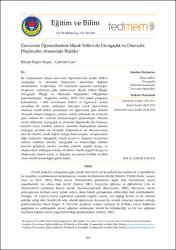Üniversite Öğrencilerinde Mizah Stilleri ile Utangaçlık ve Otomatik Düşünceler Arasındaki İlişkiler *
Abstract
Bu araştırmanın amacı üniversite öğrencilerinde mizah stilleri, utangaçlık incelemektir. Araştırmaya 422 üniversite öğrencisi katılmıştır. Araştırma verilerinin elde edilmesinde Mizah Stilleri Ölçeği, Utangaçlık Ölçeği ve Otomatik Düşünceler Ölçeğinden yararlanılmıştır. Araştırma verileri, SPSS 15.0 paket programı kullanılarak; t testi, korelasyon analizi ve regresyon analizi metodları ile analiz edilmiştir. Sonuçlar erkek öğrencilerin olumsuz mizah stilleri puanlarının kız öğrencilere göre anlamlı düzeyde yüksek olduğunu; olumlu mizah stillerinde ise cinsiyete göre anlamlı bir farklılık bulunmadığını göstermiştir. Olumlu mizah stillerinin utangaçlık ve otomatik düşünceler ile olumsuz; kendini yıkıcı mizahın yalnızca otomatik düşüncelerle olumlu; saldırgan mizahın ise otomatik düşüncelerin alt boyutlarından ikisi ile olumlu yönde ilişkili olduğu bulunmuştur. Araştırmanın diğer bulguları, utangaçlık, kişisel uyum ve değişme arzusunun birlikte katılımcı mizahı, utangaçlık ve ümitsizliğin birlikte kendini geliştirici mizahı, kendine yönelik negatif duygu ve düşüncelerin saldırgan mizahı, kendine yönelik negatif duygu ve düşünceler, kişisel uyum ve değişme arzusunun birlikte kendini yıkıcı mizahı yordadığını göstermiştir. This study aimed to investigate the relationships between humor styles, shyness and automatic thoughts among university students. The sample of the study consisted of 422 university students. In order to obtain the research data, the humor styles questionnaire, The Shyness Scale and the Automatic Thoughts Scale were used. The data were analyzed using SPSS 15.0 package program; via t-test, correlation analysis and regression analysis methods. The results indicated that negative humor styles of the male students were significantly higher than those of the female students, while there were no significant differences according to gender in terms of positive humor styles. Additionally, it was found that positive humor styles negatively correlated with shyness and automatic thoughts, self defeating humor positively related with automatic thoughts; and aggressive humor positively related with two subscales of automatic thoughts. Other findings of the study indicated that shyness, personal adjustment and desire for change predicted together affiliative humor; shyness and hopelessness predicted together self-enhancing humor; negative feelings and thoughts towards oneself predicted aggressive humor; and negative feelings , thoughts towards oneself personal adjustment and desire for change predicted together self-defeating humor.
Source
Eğitim ve BilimVolume
39Issue
174URI
http://www.trdizin.gov.tr/publication/paper/detail/TWpJME5UVTJOZz09https://hdl.handle.net/11421/14963
Collections
- Makale Koleksiyonu [217]
- TR-Dizin İndeksli Yayınlar Koleksiyonu [3512]


















